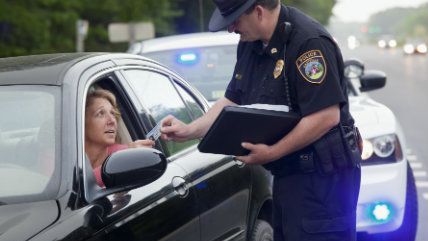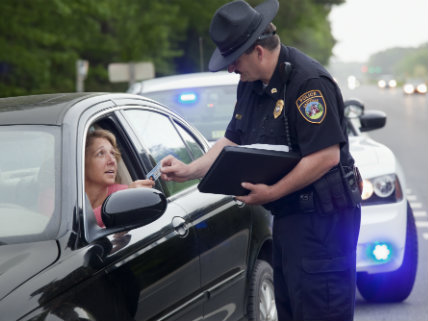Virginia Suspends Hundreds of Thousands of Driver's Licenses Due to Unpaid Court Debt
More than 900,000 people in Virginia have suspended licenses, in what a new class-action lawsuit claims is an unconstitutional revenue scheme.


Christine Johnson, 45, sat outside the Department of Public Safety in Richmond, Virginia, on a sticky summer afternoon, waiting for the bus.
Across the street was the city's Traffic General District Court, one of the state courts where about 360,000 people a year are hit with fines that will ultimately lead to their license being suspended.
Johnson's license was suspended for three months after she failed to appear in court following a traffic accident.
"Someone hit me, and I would have had to go to court and fight it," Johnson told me. "But I didn't go to court. I was in the hospital. When I started driving again, I got pulled over and found out my license was suspended for not showing up in court. So I had to file an appeal, go back to traffic court, pay $280 or $290 dollars. It took about three months. I couldn't go grocery shopping, I couldn't go do laundry. I had to start using medical transportation and paying family members to take me grocery shopping. It was horrible."
Johnson was fortunate, however, in that she could at least cover the costs. Her boyfriend, she said, has a suspended license and has racked up about $2,500 in fines. "He only works part time, so it's going to take him forever to get his license reinstated," she said. "If I have a vehicle, he'll drive my car without a license."
"My best friend, her car is registered in someone else's name, because she's got to get to work and doctor appointments, so she's driving with a suspended license," Johnson continued.
Johnson's boyfriend and best friend are among the more than 900,000 Virginia residents—roughly 11 percent of the state population—who have suspended licenses at any given time in the state. The majority of those suspensions are for unpaid court debts.
I had travelled to Richmond to talk to people with suspended licenses, figuring it wouldn't be hard to find someone with those sort of odds. I didn't have to wait long. Johnson was the first person I talked to at the bus stop.
"I thought it was a just a few of us," Virginia resident Robert Taylor, 28, told me in a phone interview. "It's easy to find us now, especially if you go to jail."
Taylor is one of four named plaintiffs in a class-action lawsuit filed in July by the Legal Aid Justice Center, an organization that provides free legal services to low-income Virginia residents, challenging Virginia's policy of suspending drivers licenses indefinitely for unpaid court debts. The state automatically suspends licenses if court fines and fees remain unpaid for more than 30 days. The lawsuit argues that the state's failure to assess whether indigent defendants can afford those fines violates their constitutional rights to due process and equal protection under the law.
"Driver's license suspension is Virginia's form of a debtors' prison," Angela Ciolfi, a senior attorney at the Legal Aid Justice Center, said in a statement. "Many areas of the state provide no reliable public transportation, effectively leaving people confined to their homes or forcing them to risk jail time by driving on suspended licenses."
The Virginia DMV directed a request for comment to the Virginia Office of the Attorney General, which declined to respond.
Taylor said working class families in rural Brunswick County, where's he's from, are hit particularly hard by the policy. "If you get a traffic ticket, it becomes a family affair to get that paid off so you don't get your license suspended," he said. "It's become a huge ordeal in the neighborhoods where I'm from."
According to a Virginia DMV snapshot of data in 2015, 65 percent of outstanding suspensions were for failure to pay court debt, and roughly 38 percent of the suspension orders that year were due to unpaid court costs or fines unrelated to driving.
"I have represented countless people for whom a minor infraction or some other offense that may be completely unrelated to driving results in them being unable to pay court costs or fines," Maria Jankowski, deputy executive director of the Virginia Indigent Defense Commission, which certifies and provides court-appointed attorneys for indigent defendants in the state, said. "Then they get into a vicious cycle where the DMV suspends their license, and they can't drive but have to get to work. That cycle is very, very, very real."
Taylor's trouble started when received a ticket for having expired license plate tags in 2009. In 2014, he was cited for running a red light, as well as driving on a suspended license—the result of unpaid fines from his previous ticket. Taylor managed to get his license reinstated, but after he was found guilty of driving on a suspended license, the court levied more fines against him without assessing his ability to pay.
He managed to pay off the first two offenses, but by that time he had gotten two more charges for driving on a suspended license. He couldn't afford the payment plans offered by the courts, many of which require down payments.
Buried under court and student loan debts, as well as medical bills from ongoing health issues, he lost his job at a T-Mobile store and has been unemployed for more than a year.
Virginia is not the only state in which fines from small infractions have left large numbers of people unable to drive legally. At least seven other states suspend licenses for unpaid court debts, a 2010 Brennan Center report found. California has suspended more than 4 million licenses for unpaid fines, according to a 2015 report by the Lawyers Committee for Civil Rights of the San Francisco Bay Area.
This week, the Western Center on Law and Poverty, a low-income advocacy group, sued Los Angeles County Superior Court, arguing it is ignoring state law that says courts should suspend licenses only when a defendant "has willfully failed to pay" a fine. The Western Center on Law and Poverty, along with other organizations including Bay Area Legal Aid and the ACLU of Northern California, also sent a letter to the California DMV this week saying the department lacks the authority to suspend licenses at the request of courts. Another report earlier this year by the Back on the Road California consortium, which includes several of the group's involved in the current lawsuit, found that "driver's license suspension rates range as high as five times the state average" in black and Latino communities.
Washington state stopped suspending licenses for unpaid fines related to nonmoving violations in 2013. Since then, suspensions have dropped by half, The New York Times reported last year.
Since the Justice Department released a report last year on Ferguson, Missouri's rapacious use of fines and fees as a revenue source, the issue has been in the national spotlight. In a "dear colleague" letter this March, Vanita Gupta, the head of the Justice Department's Civil Rights Division, wrote that "state and local courts are encouraged to avoid suspending driver's licenses as a debt collection tool, reserving suspension for cases in which it would increase public safety."
"Research has consistently found that having a valid driver's license can be crucial to individuals' ability to maintain a job, pursue educational opportunities, and care for families," Gupta wrote. "At the same time, suspending defendants' licenses decreases the likelihood that defendants will resolve pending cases and outstanding court debts, both by jeopardizing their employment and by making it more difficult to travel to court, and results in more unlicensed driving."
"It's kind of like my feet are cut off," Taylor said. "I can't get anywhere. I want a job. I'll see a job, and when I find one I'm qualified for—I know I could run that store so well—but I can't get to it. Public transportation just isn't there. The bus will bring you in, but it won't take you back out. The only way to do it is to hopefully know someone who will give you a ride. So many of my friends have gotten traffic tickets that they've moved closer to town."
And that's just the trouble for people who live close to a large city.
"In Richmond, it's bad," said David Bough, a Virginia defense attorney who is also involved in the case. "Outside, it's nonexistent. You have people out in rural places who have to drive 20 miles to their job at Walmart."
Meanwhile, the fines and fees levied by Virginia courts have expanded over the years. Courts costs for misdemeanor or traffic violations in Virginia were $20 in 1989. Now they're as high as $99 before a host of other possible charges (blood withdrawal, jail admission, court-appointed attorney for example) are added.A pile of small, random fees have accumulated over the years as well: $3 "courthouse maintenance," for example, another $15 "Internet Crimes Against Children" fee, and so on.
The result of all these policy changes is clear: According to state reports, court clerks in Virginia assessed $618 million in fines and fees in fiscal year 2014, up from $323 million (not adjusted for inflation) in 2002.
But the amount of fees actually collected by the state is much lower. Virginia only collected $258.6 million in 2014, compared to $218 million in 2002.
The Legal Aid Justice Center says these numbers suggest the threat of license suspension doesn't increase debt collection (41 percent of all cases between 2008 and 2012 resulted in default, according records provided to the group by the Virginia Auditor of Public Accounts). Instead it just adds another substantial burden to people already living paycheck to paycheck.
"It just steamrolls and gets worse and worse," Richmond public defender Tracy Paner said. "I had people in court today who had been convicted six times previously for driving on a suspended license."
Taylor currently owes more than $4,000 to four different county courts in Virginia. Even if he paid off his existing court debts and became eligible to get his license back, he would have to pay another $145 in license reinstatement fees. Meanwhile, his outstanding debts will continue to mount because of the 6 percent annual interest rate on all unpaid court fines levied by the state.
If Taylor had been convicted of a more serious felony driving offense, like reckless driving that resulted in a death, and he had the means to pay off the fines, he would have been legally back on the road a long time ago. Under Virginia law, the maximum length of a license suspension for reckless driving that results in the death of another person is 12 months.


Show Comments (118)